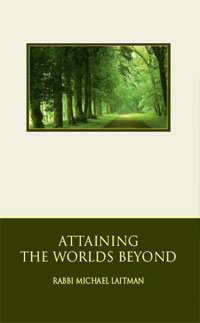The Benefit Derived from the Creator’s Concealment
In the spiritual world, all laws and desires are diametrically opposite to those of our world.
Just as in our world, it is extremely difficult to act contrary to knowledge and understanding, so in the spiritual world it is extremely difficult to progress with knowledge.
As Rabbi Yehuda Ashlag said: “It is said that when everyone stood during the service at the Temple, it was very crowded, but when everyone prostrated themselves, there was plenty of room.” The act of standing symbolizes the state of “greatness” of partzuf, the receiving of Light; whereas the act of prostrating is a state of “smallness” and represents the lack of Light.
In this lower state there was more room and a greater feeling of freedom, because in the state of the Creator’s concealment, those in the process of spiritual ascent feel the potential to advance against their reason, and this is the source of joy from their work.
The Body’s Seeming Resistance to Spirituality
Rabbi Yehuda Ashlag used to tell the story of a great Kabbalist of the last century, Rabbi Pinchas, from the village of Korits. Rabbi Pinchas had no money even to buy Ari’s The Tree of Life, and was forced to teach children for half a year in order to earn the money needed to purchase this book. Even though it may appear that our bodies are an obstruction to our spiritual ascent, it only seems this way because we are not aware of the functions that the Creator assigned to them.
As Rabbi Yehuda Ashlag said: “Our body is like an anker (a part in a watch); even though the anker stops the watch, without it the watch would not work, it would not move forward.”
At another time, Rabbi Ashlag said: “In the barrel of a long- range shotgun there is a special threading which makes the exit of the bullet difficult, but precisely because of this threading the bullet flies farther and is more accurate.” In Kabbalah such a state is known as kishui.
The Importance of Spirituality Conveyed through Quotes
Rabbi Yehuda Ashlag said: “Everyone is so accustomed to interpreting the Bible in accordance with the concepts of this world, that even when it is explicitly stated in the Bible, ’Guard your souls,’ it is still understood to mean the health of the body.”
Rabbi Yehuda Ashlag said: “An individual is in the spiritual state to the extent that he realizes that his egoistic desires are, in essence, the impure force.”
Rabbi Yehuda Ashlag said: “The lowest of the spiritual levels is attained when the spiritual becomes most important and comes before the material.”
Rabbi Yehuda Ashlag said: “In only one thing can a person display haughtiness; that is, in asserting that no one else can please the Creator more than he himself.”
Rabbi Yehuda Ashlag said: “The reward for keeping a Commandment is in gaining the perception of the One who commands it.”
Rabbi Yehuda Ashlag said: “The worries of this world are of no concern to those engaged in spiritual ascent, just as the person who is seriously ill does not worry about getting his salary, but only about surviving the illness.”
No Time for Rest on the Spiritual Path
Rabbi Yehuda Ashlag said: “In the spiritual, as in our physical world, if something occurs to us because of circumstances that were beyond our control, this fact itself will not save us. For example, if someone inadvertently falls off a cliff, the mere fact that he fell, even though he did not want to fall, will not save him from dying.
The same is true in the spiritual world. When Rabbi Yehuda Ashlag was sick, a doctor was called to come and see him. The doctor prescribed rest and peace, suggested that it was important to calm down the patient’s nerves, and remarked that if he was to engage in learning, he should choose something uncomplicated like The Psalms.
When the doctor left, Rabbi Yehuda commented, “It seems that the doctor thinks it possible to read The Psalms superficially, without looking for a deeper meaning.”
Kabbalah Promises Spiritual Perception Attainment in this Life
Rabbi Yehuda Ashlag said: “There is no place in between the spiritual, altruistic ’giving’ and the material, egoistic, impure ’receiving.’ If at every single moment a person is not bound to the spiritual, he forgets about it altogether and remains in the impure and physical state.”
It is said in the book, Hakuzari, that the King Kuzari, when it came time to select a religion for his people, turned to a Christian, to a Muslim, and finally to a Jew. When the King heard the Jew, he remarked that the Christian and the Muslim both promised him eternal heavenly life and great rewards in the world to come, after his death. On the other hand, the Jew spoke of the rewards for the observance of the Commandments and the punishment for disobeying them in this world.
But it seemed to the King that it was more important to be concerned with what he would receive in the world to come, after death, than with the way he should live his life in this world.
The Jew then explained that those who promise reward in the world to come, do so because they want to distance themselves from the falsehood in this manner, to conceal the lie and the meaning in their words. In a similar fashion, Rabbi Yehuda Ashlag explained that the words of Agra, the concept of yehudi (“Jew”) is the name for one who attained the entire spiritual world, the whole world to come, while in this world.
This is what Kabbalah promises us as a reward. All of the rewards of Kabbalah must be received while a person is in this world, specifically while in the body, to feel everything with one’s entire body.
 “The Method for Attaining Spirituality in this Life” is based on the book, Attaining the Worlds Beyond by Dr. Michael Laitman.
“The Method for Attaining Spirituality in this Life” is based on the book, Attaining the Worlds Beyond by Dr. Michael Laitman.

